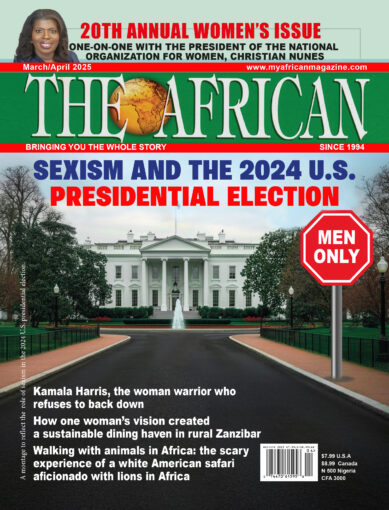Calling out the absurd belittling of women

BY SOUMANOU SALIFOU
One of the most absurd things that can be said about the last U.S. presidential election is that sexism did not play a role. Probably the wildest things of all, some men would not vote for a woman presidential candidate because, in their view, women are too emotional. Do they know how many times Donald Trump woke up in the middle of the night to tweet something crazy just about anything? If such erratic behavior does not qualify for being too emotional, even if one factors in the guy’s legitimate fear of going to prison for repeatedly breaking the law, what does?
The 2024 election is behind us, so there is no need to dwell on JD Vance’s “childless cat ladies” trope or Trump’s vulgar statements about former Vice President Kamala Harris that this magazine cannot go in the mud to repeat.
To be fair, though, Donald Trump, JD Vance and their acolytes, including one popular stand-up comedian who took sexism to an obscene level during the campaign, did not invent sexism. This is a male-made prejudice that has been around since the dawn of times.
Far from me the intention of pitting man against woman, two arms of the same body that contribute to the functioning of society. But, like countless men out there, I feel the urge in this annual women’s issue to call out the absurd characterization of women as being driven by emotion.
To avoid the appearance of subjectivity, I want to refrain from sharing my own story, the experience of a boy who lost his father at the age of 11 and was raised, along with his five siblings, by a mother who never lost her cool in the face of huge challenges. Not only did she always meet all our needs without complaining, but she also sent some of us to the finest schools in the UK and the US. Instead, I will point to several studies, many of which are available online, that have shown women’s innate ability to control their emotions better than men.
You may also want to read: Nobody should show Trump respect
Studies conducted by researchers at several American universities, including Mara Mather, a professor of gerontology and psychology at the University of California’s Davis School of Gerontology, and Ruud van den Bos and his team at Radboud University, have shown that women tend to be calmer under stress than men because they react differently to cortisol, a hormone that the human body immediately produces in response to threat. The findings were shared in The Guardian in 2016 by Dr. Therese Huston—holder of a Ph.D. in Cognitive Psychology—in an article titled “Do women stay cooler under stress than men?”

Like many others, this study also shows women’s reluctance to rush into risk-taking. Describing the study, Therese Huston writes, “Men were thinking, at some level, both ‘Act and act now’ and ‘Damn, this is risky.’ It could mean that men were having highly emotional reactions to the risky decision, contrary to the way men are usually portrayed. In contrast, women showed the opposite response: these two brain areas being markedly quieted down in female subjects.” Huston concludes, “It’s as though women were, without conscious intent, thinking: ‘No need to rush this’ and ‘Let’s not take risks we don’t need to.’”
In light of the above, is it not plain common sense for us to trust a woman as much as we do a man to lead us? In fact, aren’t we safer in the hands of the gender that is calmer under pressure and reluctant to hurry to risk-taking such as rushing us into a war?
Even while in the shadow of their very important men, women often play crucial roles in major decision-makings, yet we absurdly belittle them. The American actor Dick Van Dyke put it poetically by saying, “Women will never be as successful as men because they have no wives to advise them.”
____________
Soumanou Salifou is the founder/publisher of The African, the premier African magazine published in the United States, dating to 1994.

